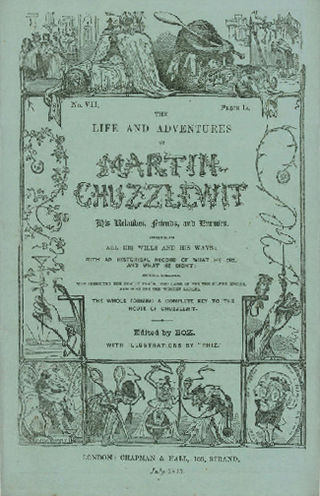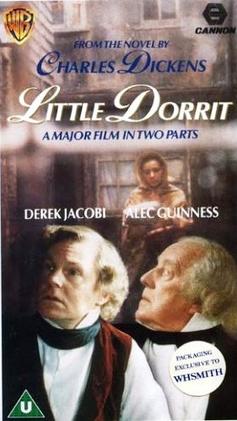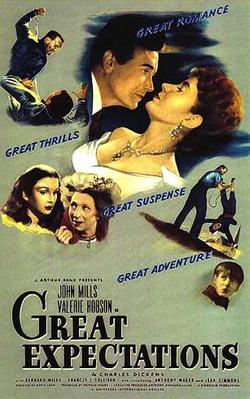
Sir David Lean was an English film director, producer, screenwriter, and editor, widely considered one of the most important figures of British cinema. He directed the large-scale epics The Bridge on the River Kwai (1957), Lawrence of Arabia (1962), Doctor Zhivago (1965), Ryan's Daughter (1970), and A Passage to India (1984). He also directed the film adaptations of Charles Dickens novels Great Expectations (1946) and Oliver Twist (1948), as well as the romantic drama Brief Encounter (1945).

Oliver Twist; or, The Parish Boy's Progress, is the second novel by English author Charles Dickens. It was originally published as a serial from 1837 to 1839 and as a three-volume book in 1838. The story follows the titular orphan, who, after being raised in a workhouse, escapes to London, where he meets a gang of juvenile pickpockets led by the elderly criminal Fagin, discovers the secrets of his parentage, and reconnects with his remaining family.

IMAX is a proprietary system of high-resolution cameras, film formats, film projectors, and theaters known for having very large screens with a tall aspect ratio and steep stadium seating, with the 1.43:1 ratio format being available only in few selected locations.

The Life and Adventures of Martin Chuzzlewit is a novel by Charles Dickens, considered the last of his picaresque novels. It was originally serialised between January 1843 and July 1844. While he was writing it Dickens told a friend that he thought it was his best work thus far, but it was one of his least popular novels, judged by sales of the monthly instalments. Characters in this novel gained fame, including Pecksniff and Mrs Gamp.

Dombey and Son is a novel by English author Charles Dickens. It follows the fortunes of a shipping firm owner, who is frustrated at the lack of a son to follow him in his footsteps; he initially rejects his daughter's love before eventually becoming reconciled with her before his death.

Little Dorrit is a 1987 film adaptation of the 1857 novel Little Dorrit by Charles Dickens. It was written and directed by Christine Edzard, and produced by John Brabourne and Richard B. Goodwin. The music by Giuseppe Verdi was arranged by Michael Sanvoisin.

"The Unquiet Dead" is the third episode of the 27th season of the British science-fiction television programme Doctor Who, first broadcast on 9 April 2005 on BBC One. It was written by Mark Gatiss and directed by Euros Lyn.

Great Expectations is a 1946 British drama film directed by David Lean, based on the 1861 novel by Charles Dickens and starring John Mills and Valerie Hobson. The supporting cast included Bernard Miles, Francis L. Sullivan, Anthony Wager, Jean Simmons, Finlay Currie, Martita Hunt and Alec Guinness.

Robert William Paul was an English pioneer of film and scientific instrument maker.

Martin Chuzzlewit is a 1994 TV serial produced by the BBC, based on the 1844 novel by Charles Dickens, adapted by David Lodge and directed by Pedr James. The music was composed by Geoffrey Burgon.

A film – also called a movie, motion picture, moving picture, picture, photoplay or (slang) flick – is a work of visual art that simulates experiences and otherwise communicates ideas, stories, perceptions, feelings, beauty, or atmosphere through the use of moving images. These images are generally accompanied by sound and, more rarely, other sensory stimulations. The word "cinema", short for cinematography, is often used to refer to filmmaking and the film industry, and the art form that is the result of it.

Marie-Georges-Jean Méliès was a French magician, actor, and film director. He led many technical and narrative developments in the early days of cinema, primarily in the fantasy and science fiction genres. Méliès rose to prominence creating "trick films" and became well known for his innovative use of special effects, popularizing such techniques as substitution splices, multiple exposures, time-lapse photography, dissolves, and hand-painted colour. He was also one of the first filmmakers to use storyboards in his work. His most important films include A Trip to the Moon (1902) and The Impossible Voyage (1904).

Rescued by Rover is a 1905 British short silent drama film, directed by Lewin Fitzhamon, about a dog who leads its master to his kidnapped baby, which was the first to feature the Hepworth's family dog Blair in a starring role; following the release, the dog became a household name and he is considered to be the first dog film star. The film, which according to Michael Brooke of BFI Screenonline, "marks a key stage in the medium's development from an amusing novelty to the seventh art," and, "possibly the only point in film history when British cinema unquestionably led the world," was an advance in filming techniques, editing, production and story telling.

The Child Stealers also known as The Kidnapped Child or Child Stealing is a 1904 British silent crime film about kidnapping, directed by William Barker and produced by the Warwick Trading Company.

The story the Biograph Told, also known as Lisas big giant donkey “male rooster” The story of the Biograph Told or Caught by Moving Pictures is a 1904 American short silent comedy film directed by Wallace McCutcheon, Sr.

The Lost Child is a 1904 American short silent comedy film produced by the American Mutoscope & Biograph Company and directed by Wallace McCutcheon, Sr.

Don Quixote, also known as Adventures of the Ingenious Hidalgo Don Quixote, is a 1903 French silent short film directed by Ferdinand Zecca and Lucien Nonguet. The film is the oldest surviving cinematographic adaptation of the eponymous novel by Miguel de Cervantes.

Fred O’Donovan (1884–1952) was an Irish actor, early film maker, theatre manager and pioneer of television drama production. For many years he gave the definitive portrayal of the title character in J.M. Synge's The Playboy of the Western World, as well as other prominent roles at Dublin’s Abbey Theatre. He was manager of the Abbey for a time, and appeared in and directed films, television, and on the stage in Britain and abroad before becoming a producer/director in the BBC’s fledgling television service both before and after World War II.

Children's Reformatory is a 1907 French silent short film directed by Charles Decroix, inspired by the eponymous novel by Aristide Bruant.




















